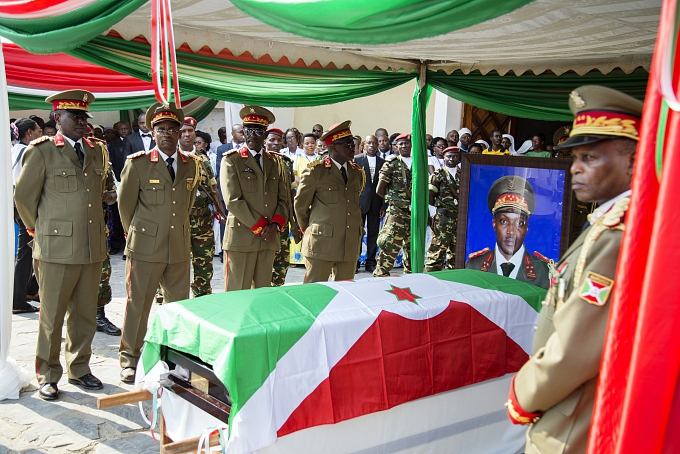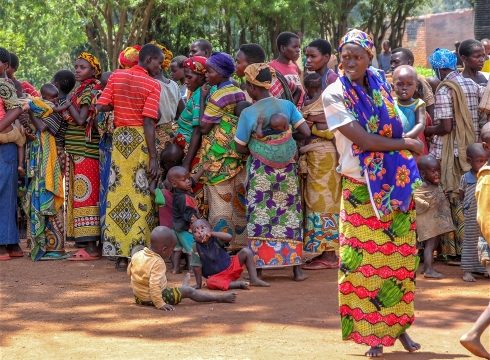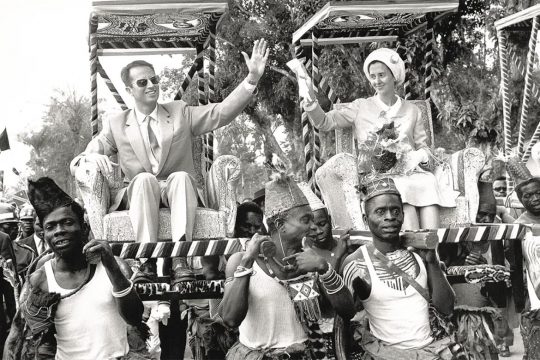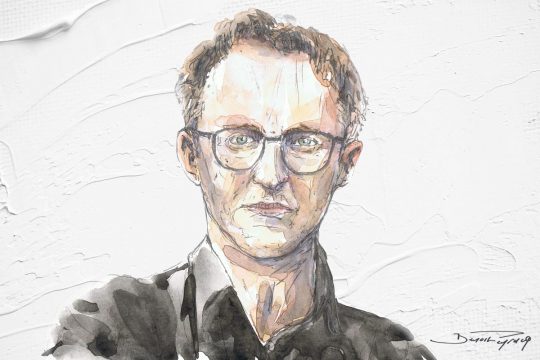Paris University professor André Guichaoua is a leading specialist on the African Great Lakes region. In an exclusive interview with JusticeInfo.Net, he analyses recent developments in Burundi, from when President Pierre Nkurunziza was sworn in for a controversial third term to recent assassinations and failed attacks.
JusticeInfo.Net: Why do you think President Nkurunziza’s August 20 swearing-in ceremony was done in an impromptu and low-key way?
André Guichaoua: There have been lots of theories about the organization of the ceremony and the choice of date, but contrary to appearances, it was not at all improvised.
For the authorities, there were three priorities. First, to close the chapter of the election period which had become a turbulent struggle ever since Nkurunziza’s candidacy was announced on April 26, 2015. They also needed to maintain uncertainty about the date and time of the swearing-in so as to reduce as much as possible the risk someone could disrupt it or “pollute” official and international media coverage. Lastly they wanted to show the Burundian people and the international media a ceremony that was solemn and serious, allowing the President to reaffirm his authority and present his policies, despite the current troubles and uncertainty about the future.
The sequencing of the ceremony and the impact of the President’s speech were meant to erase the surprise element, big security deployment, blocking of traffic in the capital, rather unofficial invitations sent out the same morning through Tweets from the presidential PR office, and above all the absence of personalities who would normally attend (regional Heads of State, diplomats, representatives of constituent bodies, etc.)
The invitation and presence of foreign and national personalities had been weighed up. It was likely that they would boycott, but now their absence could be put down to the very short notice given. It was up to the official media [1], who have a monopoly, to make up for the absence of personalities “unable to come” by broadcasting endless messages of congratulation to the President. The fear of unrest was also real, since the obligatory national guests and few foreign representatives who would definitely come were invited very early the same day and had to wait a long time before the officials and “informed” guests came to take their places when the President chose.
JusticeInfo.Net: In his policy statement on August 26, President Nkurunziza insisted that “those who disturb public order” must be neutralized. Should we interpret that as a call to prepare for war?
AG: It is not a call but an affirmation that he has a strong will to restore public order and political normalization, which everyone can already see is operational, restrictive, determined and likely to last. Everyone can interpret that statement their own way, but no-one can claim they have not been duly informed of the current rules of the political game. Given the uncertain if not arbitrary criteria that often precede denunciations, arrests and prosecutions, and victims’ fear of recourse to judicial means, any dissent with official policy may be considered a disturbance of public order and subject to punishment.
JusticeInfo.Net: Who is doing the killing in Burundi? Is it both supporters of the President and the opposition?
AG: The recent political assassinations can certainly be attributed to both sides, but it’s probably wrong to reduce the analysis to two camps. Each camp is itself divided, with diverse components that do not have the same aims or methods.
The opposition, if we look at its formal framework of the Council for the Respect of the Arusha Agreement and Rule of Law in Burundi (CNARED) is not at all uniform and is deeply divided (political parties, dissenters from the presidential party CNDD-FDD, soldiers, civil society).
Since CNARED spokespeople lack good coordination and/or authority over all the associated movements, they have to assume responsibility for acts carried out by components of CNARED without necessarily being sure when they claim or disclaim those acts that it is true.
Also we should not forget that the failure of the big protest movement in April-May and subsequent repression have led many young, mostly disorganized protesters to flee the country, along with numerous deserters from the army and police. All these people are potentially available to join various initiatives, according to the offers that are made to them. So the opposition has no clear strategy, and is therefore weak and vulnerable to manipulation by the other side.
As for the president’s side, it has a lot of components (police, army, CNDD-FDD party and its ramifications, Imbonerakure youth, judicial apparatus), and thanks to their strong grounding in the institutions they control enough levers of power to act, to silence people, induce action, turn a blind eye, etc.
Having said this, it is also clear that behind the façade of unity that has been adopted in the months since the President’s third-term bid was announced, many officials in these institutions do not agree with the policy of the hardliners in the purged leadership of the CNDD-FDD. Similarly, since the start of the popular protest in the spring, the “integrated” armed forces, guarantors of the new constitutional order laid down in the Arusha peace accords clearly distanced themselves on the ground from repressive police acts against the demonstrators [2]. It is also Hutu and Tutsi soldiers that are currently being accused of involvement in the May 13, 2015 attempted coup.
These various hidden adversaries are feared more because they are informed officials who are part of the machinery of power and have drawn lessons from the failure of the alleged putsch. Since the assassination of General Adolphe Nshimirimana on August 2 and especially the September 11 assassination attempt on army chief of staff Prime Niyongabo, there is in the regime suspicion and fear of these “professionals” who have access to the same means and show the same determination as other dignitaries of the regime. This observation probably helps respond to the initial question on the chaotic organization of the President’s swearing-in ceremony.
JusticeInfo.Net: The CNARED newly created by Nyangoma and others has taken an equally belligerent line. Are they really preparing an armed attack? Do they have foreign support, for example in Rwanda, as Bujumbura claims?
AG: Certain groups or components of these groups are undoubtedly convinced of, or considering armed struggle. But for the Hutu rebels of the 1990s, it took years to establish the sure support they needed and get the military resources to take on the increased military apparatus and armed forces. The current acts of resistance, notably in rebel areas of the capital and around Kibira forest, consist of throwing grenades, beating people up and assassinating them, attacking police and soldiers. These small groups of activists are maintaining tension and fear, fuelling the repression, but not really putting the current regime in danger.
They get direct and indirect support from abroad, even if only from Burundians who have fled the country to fight the regime.
The Rwandan authorities have not hidden their opposition to Nkurunziza’s third term, and look very favourably on all those who work to undermine his regime. But the main concern of Rwanda and other neighbouring countries is first to identify from among the alternative candidates or teams the ones that could best serve their own interests. Looked at from this angle, structures like CNARED do not really correspond with the usual standards of Rwandan politics.
JusticeInfo.Net: The countries of the region seem in recent weeks to have abandoned Burundi to its fate. Why?
AG: The Burundian authorities have signalled clearly to the regional and international mediators that they don’t want advice and think they can govern the country the way they want under the mandate they have received. So you can’t say Burundi has really been abandoned to its fate because it has deliberately distanced itself from the negotiators and humiliated them. Given the current balance of power on the ground and despite sympathy for CNARED, it seems rather that it is the leaders of that opposition Council that feel they have been abandoned to their fate and their differences.
Thus it was that on September 10, 2015, the Justice Minister allowed the leak of a report by a commission of inquiry he had set up into the protest movement unleashed on April 26. The report mentions most leaders of the “insurrectional” opposition, and their names have been given to Interpol. The regime plans to promote a policy of national unity without them, with support from the Forum of political parties, which groups 26 of the 39 parties “active” in Burundi, kindled mainly by the Interior Ministry and the CNDD-FDD party.
Whilst the authorities categorically refuse to take lessons from neighbours on maintaining order and respecting public and individual freedoms, they now need to convince the countries of the region that they can re-establish peace and security for all, repatriate the refugees and get credit, in both senses of the term, from the relaunch of economic activity and launch of big development programmes that they have promised. This needs to translate in the short term into payment of State employees’ salaries, the recovery of public finances and the return of capital that has flown. It is only when the Burundian authorities succeed or fail that the wait-and-see approach of neighbouring countries will change.
[1] The official media were also requisitioned at the last minute to avoid leaks and maintain suspense.
[2] The police are mainly composed of former Hutu rebel fighters, whereas the army is composed equally of former Burundian Armed Forces (Tutsi) and Hutu rebel fighters.






